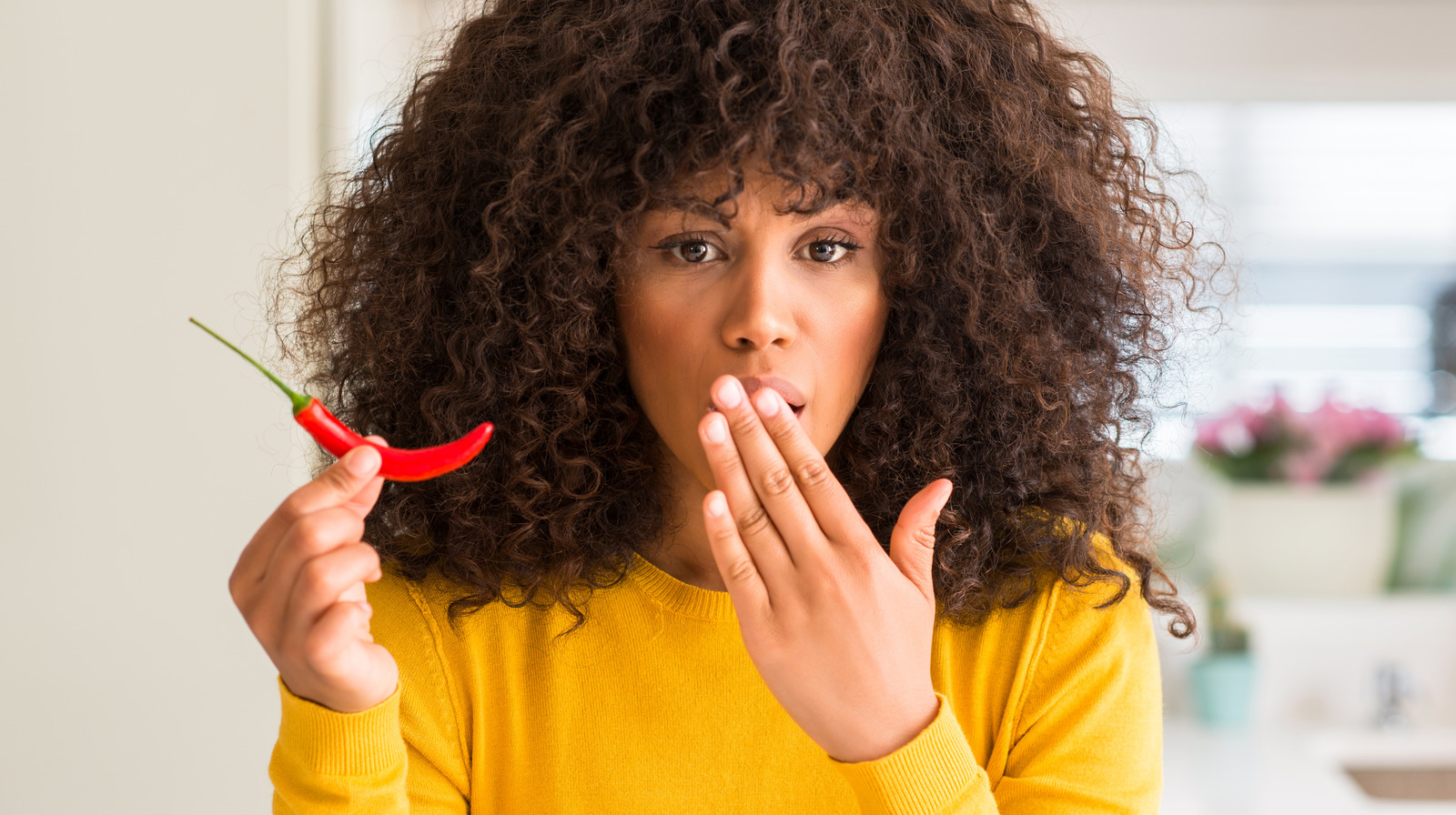
Why Does Eating Spicy Food Make You Sweat? – Health Digest
Your lips tingle and your tongue is set on fire. Your mucous membranes that protect your lungs from threats stir up a runny nose. Your blood vessels dilate, and your body feels like it’s on fire. So you begin to sweat to help cool your body. Don’t you just love spicy food?
No matter how hot or cold your food is, the spice can still have you sweating. That’s because spicy food isn’t really hot in temperature, according to Fisher Science Education. Spiciness in our food is due to capsaicin, the substance that gives a pepper its “heat.” A food’s level of spiciness is measured based on the degree to which it provokes our reaction to the capsaicin — the measurement is called a Scoville Heat Unit (SHU). Bell peppers score a 0, banana peppers can be 900, jalapeños can get as high as 10,000. And the habanero? That’s at 350,000. A scorpion sting and pepper spray can get into the two million range, and pure capsaicin is at 16 million SHU (per American Chemical Society).
So if it’s not the temperature, what is it about spicy food that has you dripping with sweat?
How your body responds to capsaicin
 Doucefleur/Shutterstock
Doucefleur/Shutterstock
According to The Conversation, our mouths have TRPV1 receptors that detect heat and prevent us from eating food that’s too hot. Capsaicin triggers these TRPV1 receptors, which sends a signal to the brain that we’re eating something dangerously hot. The brain responds by sending a burning sensation to that part of our mouth. Then the body responds the way it should to hot temperatures – by sweating. You might also notice that you feel a rush while eating spicy food. That’s because your body misinterprets capsaicin as a threat, so it releases both dopamine and adrenaline as a response, according to Cooking Genie.
Capsaicin also isn’t quite broken down in our digestive tract, so you’ll feel that same burning when it’s on its way out of your system, according to Everyday Chemistries. If the heat in your spicy food overwhelms you, avoid water, according to the American Chemical Society. That will add more flame to the fire. Instead, drink milk or eat ice cream or cottage cheese. The casein in these dairy products wraps around capsaicin and helps remove it from your tongue. And by the way, be aware that it’s the membrane that holds a pepper’s seeds, not the seeds themselves, that hold the heat.
The benefits of spicy food
 Soho A Studio/Shutterstock
Soho A Studio/Shutterstock
If you can take the heat (and sweat), spicy food has great health benefits. According to a 2011 study in Physiology & Behavior, adding red pepper to your food can increase how many calories you burn in a day. If you typically eat more bland food, red pepper can reduce your cravings for fatty, salty, and sweet foods. However, your taste buds can build up a tolerance for spicy food, so this craving-killer only lasts for a short while.
A 2012 systematic review in Appetite determined that adding significant heat to your meals can help you burn up to 50 extra calories a day. That could add up to a 5-pound weight loss in just a year. Consuming spicy food can also reduce abdominal fat and help reduce your appetite. The study said these effects are partly due to how capsaicin stimulates the TRPV1 receptor.
A 2017 study in PLOS One looked at hot red chili consumption and mortality among more than 16,000 people in the United States. People who regularly ate spicy food had a 13% reduction in death from any cause. Researchers also noted that capsaicin’s activation of the TRPV1 receptors affects obesity by way of increased energy expenditure and effect on blood lipids. The capsaicin in spicy food can protect our cells from cancer, stop cancer growth, and interfere with cancer malignancy and metastasis, according to a 2016 review in Anticancer Research.








